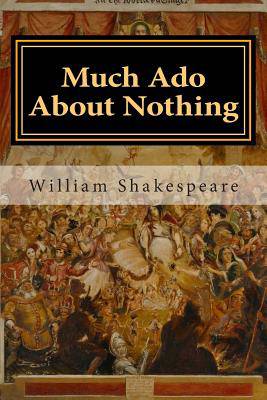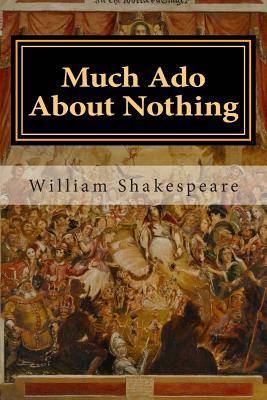
Vous voulez être sûr que vos cadeaux seront sous le sapin de Noël à temps? Nos magasins vous accueillent à bras ouverts. La plupart de nos magasins sont ouverts également les dimanches, vous pouvez vérifier les heures d'ouvertures sur notre site.
- Retrait gratuit dans votre magasin Club
- 7.000.000 titres dans notre catalogue
- Payer en toute sécurité
- Toujours un magasin près de chez vous
Vous voulez être sûr que vos cadeaux seront sous le sapin de Noël à temps? Nos magasins vous accueillent à bras ouverts. La plupart de nos magasins sont ouverts également les dimanches, vous pouvez vérifier les heures d'ouvertures sur notre site.
- Retrait gratuit dans votre magasin Club
- 7.000.0000 titres dans notre catalogue
- Payer en toute sécurité
- Toujours un magasin près de chez vous
Description
Much Ado About Nothing is a comedic play by William Shakespeare thought to have been written in 1598 and 1599, as Shakespeare was approaching the middle of his career. The play was included in the First Folio, published in 1623. Much Ado About Nothing is generally considered one of Shakespeare's best comedies, because it combines elements of robust hilarity with more serious meditations on honor, shame, and court politics. By means of "noting" (which, in Shakespeare's day, sounded similar to "nothing" as in the play's title, and which means gossip, rumour, and overhearing), Benedick and Beatrice are tricked into confessing their love for each other, and Claudio is tricked into rejecting Hero at the altar on the erroneous belief that she has been unfaithful. At the end, Benedick and Beatrice join forces to set things right, and the others join in a dance celebrating the marriages of the two couples. In Messina, a messenger brings news that Don Pedro, a prince from Aragon, will return that night from a successful battle, Claudio being among his soldiers. Beatrice, Leonato's niece, asks the messenger about Benedick, Don Pedro's companion, and makes sarcastic remarks about his ineptitude as a soldier. Leonato explains that "There is a kind of merry war betwixt Signor Benedick and her." Upon the arrival of the soldiers, Leonato welcomes Don Pedro and invites him to stay for a month, Benedick and Beatrice resume their "merry war " and Pedro's illegitimate brother Don John is introduced. Claudio's feelings for Hero, Leonato's only daughter, are rekindled upon seeing her, and Claudio soon announces to Benedick his intention to court her. Benedick, who openly despises marriage, tries to dissuade his friend but Don Pedro encourages the marriage. Benedick swears that he will never get married. Don Pedro laughs at him and tells him that when he has found the right person he shall get married. A masquerade ball is planned in celebration of the end of the war, giving a disguised Don Pedro the opportunity to woo Hero on Claudio's behalf. Don John uses this situation to get revenge on his brother Don Pedro by telling young Claudio that Don Pedro is wooing Hero for himself. A furious Claudio confronts Don Pedro, but the misunderstanding is quickly resolved and Claudio wins Hero's hand in marriage. Meanwhile, Benedick disguises himself and dances with Beatrice. Beatrice proceeds to tell this "mystery man" that Benedick is "the prince's jester, a very dull fool." Benedick, enraged by her words, swears he will have revenge. Don Pedro and his men, bored at the prospect of waiting a week for the wedding, harbour a plan to match-make between Benedick and Beatrice. They arrange for Benedick to overhear a conversation in which they declare that Beatrice is madly in love with him but afraid to tell him; that their pride is the main impediment to their courtship. Meanwhile, Hero and her maid Ursula ensure Beatrice overhears them discuss Benedick's undying love for her. The tricks have the desired effect: both Benedick and Beatrice are delighted to think they are the object of unrequited love, and both accordingly resolve to mend their faults and reconcile. Meanwhile, Don Pedro's brother Don John, the "bastard prince", plots to stop the wedding, embarrass his brother and wreak misery on Leonato and Claudio. He informs Don Pedro and Claudio that Hero is unfaithful, and arranges for them to see John's associate Borachio enter her bedchamber where he has an amorous liaison (actually with Margaret, Hero's chambermaid). Claudio and Don Pedro are taken in, and Claudio vows to humiliate Hero publicly.
Spécifications
Parties prenantes
- Auteur(s) :
- Editeur:
Contenu
- Nombre de pages :
- 100
- Langue:
- Anglais
Caractéristiques
- EAN:
- 9781500368166
- Date de parution :
- 30-06-14
- Format:
- Livre broché
- Format numérique:
- Trade paperback (VS)
- Dimensions :
- 152 mm x 229 mm
- Poids :
- 145 g







